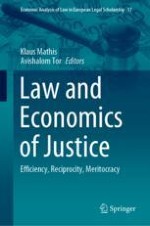2024 | OriginalPaper | Buchkapitel
15. Equal Opportunity in an Unequal Society
verfasst von : Eran Fish
Erschienen in: Law and Economics of Justice
Verlag: Springer Nature Switzerland
Aktivieren Sie unsere intelligente Suche, um passende Fachinhalte oder Patente zu finden.
Wählen Sie Textabschnitte aus um mit Künstlicher Intelligenz passenden Patente zu finden. powered by
Markieren Sie Textabschnitte, um KI-gestützt weitere passende Inhalte zu finden. powered by
